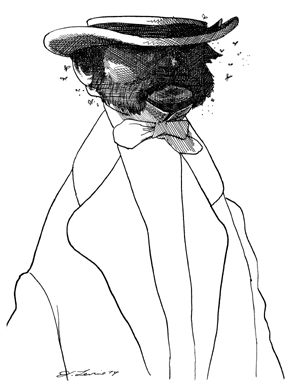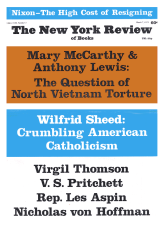On the face of it, it is extraordinary that one of the great comic novels of the Russian nineteenth century should have come from the hand of the most pedestrian, industrious, conservative of state officials, Ivan Goncharov, a man outwardly devoid of fantasy and lacking inventive powers. From what leak in a mind so small and sealed did the unconscious drip out and produce the character of Oblomov, the sainted figure of nonproductive sloth and inertia; one of those creatures who become larger and larger as we read?
The simple view—still held by some Soviet critics and encouraged by remarks of Goncharov himself—is that Oblomov was an exposure of the laziness and ineffectiveness of the land-owning class; but as it grew in the slow process of the writing (which took between ten and thirteen years) the novel became far more than that. Several contemporary critics have even suggested a prophetic kinship with Beckett and have noted the protest against the work ethic that has created a sense of emptiness and boredom in the modern world. Everyone exclaims at the influence of Don Quixote, to which Russian literature has so often responded; and, thinking of Goncharov’s case, one could say that it is just as extraordinary that the author of the neat Exemplary Novels should also have burst the formal bonds of his period. All one can say is that literature has a double source: one in life, the other in literature itself, and if one is going in for the influence game, Goncharov’s admiration for Tristram Shandy—the corresponding English comedy of domestic lethargy—may be thought to have helped to bemuse his dilatory and very literary mind. Like Sterne he was following a tune in his head.
The interest of Professor Ehre’s scholarly work lies in his close knowledge of Russian critical writing and his observation of the detail of Goncharov’s impulses and methods as a novelist. Oblomov appeared to be a work of objective realism as minute in this respect as a Flemish picture done from the outside, yet in fact it comes from the inner, so to say, secret anxiety of an organized, even carefully dulled temperament. This anxiety is a nostalgia for what has been lost, an edginess suggesting fear of a hidden “abyss” that lies close to one who, torn between the ideal and the practical, has opted for the respectable golden mean.
There is, at times, an air of fret in Oblomov’s nature that makes him seem on the brink of madness from which surrender to his sloth, perhaps, saved him. This madness came out in the form of paranoia in Goncharov himself toward the end of his life when he accused Turgenev and even Flaubert of stealing his ideas. Goncharov was State Censor and, may be, the man who had such political power over the works of his contemporaries had been quietly boiling with the jealousies of the unconscious and the temptations of his excessively right-thinking profession. Censors go mad, just as prison governors come to feel, as prisoners do, that the only righteous people are those inside. The curious fact is that the unconscious of Goncharov, a lifelong bachelor, pushed him in old age into a fate like Oblomov’s: isolated, petulant, fond of food, he surrendered himself to the care of his manservant’s widow, whom he called his”nursemaid” and “little mother,” and he left his fortune to her and her children, whom he had virtually adopted.
Before making his closely analyzed study of Goncharov the artist who wrote only three novels in his life, Professor Ehre points to the important wounds and compensations in the personal story. It is a little like Gogol’s, if it is more respectable. It has some not dissimilar seeds of instability, and since Goncharov’s writing was very autobiographical—and in this sense unimaginative—the real life is important. He came from a well-off family of the merchant class—and was the child of the second marriage of an elderly man and a girl of nineteen. The father died when the boy was seven, and a rich relation of the landowning class, an educated man of the world, took charge of the family. This Tregubov is one of the sources of Oblomov. The boy had thus two fathers: the real one, a religious fanatic, dedicated to ritual and Byzantine formalism, and a melancholic; the other, an aristocrat, an intellectual, a humanist, a disciple of Voltaire and the Enlightenment, full of charm and totally indifferent, in the manner of the Russian landowners, to the practical demands of running his large estate at Simbirsk, a region often ridiculed for its sleepy and comic provinciality.
The place was an Oblomovka in itself and is precisely evoked in Oblomov’s famous dream. As so often happens in countries where the males are denied a ruling political role, the women become the power figures: Goncharov adored his mother who was, however, one of those strict and practical Varvara Petrovnas who rule the Russian novel. She saw severely to his education, got him to Moscow University, and fitted him to become the efficient civil servant he eventually became. He was nevertheless uneasy in aristocratic company—rather jealous too—and among talented contemporaries like Belinsky, Herzen, and Turgenev he was obliged to be only a spare-time writer. The truth is that his upbringing and temperament were as much to blame as was class consciousness for the neurotic indecisiveness which plagued and protracted his attempts to write. Indecisiveness also ensured that his one known love affair—the model for Oblomov’s love of Olga—should fizzle out. There is a failure to join romantic idealism to practicality and action, to give up the pleasures of talk for the risk of the deed; the personality is split and, in the end, the deep boredom or ennui so familiar in Russian literature of the time becomes a sort of governing secret society in his nature.
Advertisement
Such maladies can be an enormous advantage to the man who can goad himself into the writing of a master-piece. Cold, cold, cold, Chekhov complained of Goncharov; but knowing he had talent, susceptible if not inventive, turning self-mockery into play, frightened of the possibility of losing his talent, Goncharov dragged on year after year, forcing Oblomov to become a work of art. It is typical of the paralyzing indecisiveness of his nature that he was working on another long novel, The Precipice, at about the same time and that while Oblomov was a study of stagnation almost without direct narrative and plot, The Precipice was sternly political and acted out with crude bad temper in dramatic episodes. This book was a failure.
But it would be wildly wrong, as Professor Ehre shows, to think of Goncharov groping or blundering in his methods. The most revealing chapters of Ehre’s study are those that follow in detail Goncharov’s clear understanding of what he was doing, and the principles he stuck to and the value he put upon the need to allow memory and the unconscious to ripen and form his work. He knew he was a conservative artist, that a form in which life stood still was indispensable; that he was dealing in types which would cease to be types and become symbols, that the more realistic his scenes were the more subjective must be the moving force.
In the chapter on the novelist’s aesthetic views, Ehre quotes two passages from Goncharov’s letters that show he had an exact notion of what he was doing and that Oblomov is not an oddity blown up to sprawling proportions:
[The writer] should write not from the event but from its reflection in his creative imagination, that is, he should create a verisimilitude which would justify the event in his artistic composition. Reality is of little concern for him.
Art represents nature as a refracted image. Reality was too “varied” and “original” to be taken as a whole. He said much the same thing in a letter to Dostoevsky. If the Western calendared attitude to plot and precise action escaped him, he had on his side the Russian sense of the hours of the day running through his scenes and people like a stream or continuous present.
Since I do not know Russian I cannot comment on Goncharov’s style and its rhythms, though I do see that plain or average styles such as his have to be consciously achieved. Writers who have no style are as obtuse as people who have no manners, either good or bad. Since Oblomov, like all extreme or outsize characters, is on the point of being mythical, I can, with some resistance, almost accept Ehre’s references to Freud in his comments on Goncharov’s relationship with his mother as suggesting the sun, warmth, a refuge from the Leningrad winters; and I can also see that if one looks back on childhood as an Arcadia one will have to recognize that one of the attractions of childhood is that it has a system of rules whose chief appeal is that they give comfort to the imagination.
But we do not enact myths only in our lives. It is just as satisfying when thinking of Goncharov’s difficulties in love to attribute these to the influences of Romanticism in its bourgeois phase, in which it was natural even in split personalities both to idealize and fear “ladies” as distinct from “women.” Goncharov solved his difficulty by the neurotic mockery of his feelings, i.e., by playing a game. Oblomov, after all, is reluctant, not sexless but sly. In his early comedy of manners, A Common Story, Goncharov was content with the ironic reversals of idealism in love and to show, with some relish, the price of worldliness: the young man becomes as cynical as his uncle—a Tregubov figure—and the uncle attempts disastrously to recover the follies of his youth and heart. But in Oblomov, the novelist broke out of this neat formula, with the result that the critics have been utterly divided by the account of Oblomov’s love of Olga and her marriage to Stolz; and here I find Ehre very suggestive.
Advertisement
At first reading Stolz is an allegorical stick and Olga is not much better; at later readings, Olga strikes one as being a remarkable portrait of an unformed sentimental girl acquiring the will of a real woman, and one can take the whole episode as a very penetrating study of the deceits of Romanticism in its watery, mid-century form. When Oblomov falls into the arms of his servant and has children by her, Stolz feels the sluggard is lost and has taken the plunge into the “abyss.” He has, so to say, gone native and Stolz breaks with him; but Olga sees him as one who, resisting the modern world’s worship of will and activity, has preserved the quality called “heart.” Perhaps he is self-indulgent; but Stolz remains stolid, and one understands, in theory, Olga’s unrest.
If we accept this, it remains true that the Olga-Stolz episodes are unsatisfactory, but for another reason: one of style. How important that tune in the head is! The moment we get away from Oblomov the narrative becomes flat and toneless; as Ehre says, it becomes dry, argued, and conceptualized. Goncharov’s unconscious had no living or literal material to offer when marriage was the subject. In his next novel, The Precipice, all the petulance and jealousy of the young in the new politically active generation came out in the aging Censor. His particular genius lay in the prolonged and loving farming of his only aristocratic estate: his private evil.
This Issue
March 7, 1974




